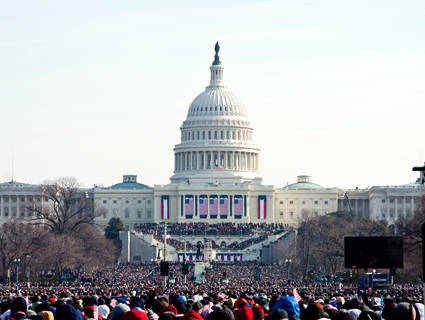
<a href="http://www.shutterstock.com/cat.mhtml?lang=en&search_source=search_form&version=llv1&anyorall=all&safesearch=1&searchterm=obama+inauguration&search_group=#id=23632018&src=df083162c739c1d750515def6adf5cd9-1-3">Paul Hakimata</a>/Shutterstock
Corporations have the green light to donate unlimited money to help fund President Obama’s second inaugural festivities this January, sources close to the planning tell Politico, a break from the Obama team’s decision four years ago to cap donations at $50,000 from individuals and shun corporate cash entirely in the interest of “chang[ing] business as usual in Washington.”
Politico‘s sources say Obama will reject donations from lobbyists and political action committees, as he did for his first inauguration. Team Obama also reportedly plans to screen all corporate donations to eliminate any conflicts of interest, and considers the decision to accept the cash common sense after an election flooded with record-breaking spending:
But the sources say the new decision is driven by pragmatism: The president and his team just wrapped up the most expensive campaign in history—with costs topping $1 billion—and they’ve determined that their donors are simply tapped out.
The cost of an Inauguration can run into the tens of millions. Obama spent $47 million in 2009. And raising that in a matter of six weeks is too difficult without throwing open the flood gates, said the sources, who spoke on condition of anonymity.
Historically, presidents have accepted corporate cash to fund their inaugurations, and Politico‘s sources compared the upcoming Obama inauguration to civic events, which corporations typically help fund. But the government reform group Public Citizen is asking Obama to go back to his old corporate-money-flouting ways, noting that his January 21 inauguration falls on the second anniversary of the Citizens United decision. (In his 2010 State of the Union address Obama slammed the decision, saying it “reversed a century of law,” but later reluctantly embraced the super-PACs it helped create.)
If Obama doesn’t take Public Citizen’s advice, it won’t be the first time he’s changed his tune and accepted corporate donations for an event. Obama and other top party officials said they would reject corporate money for the Democratic National Convention last September—Florida Rep. Debbie Wasserman Schultz, who chairs the DNC, pledged to “make this the first convention in history that does not accept any funds from lobbyists, corporations, or political action committees”—but Democrats ended up taking in more than $20 million from big business.















